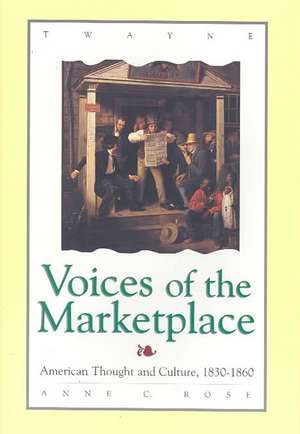Studies in the American Thought and Culture Series: Atc, 1830-1860: Twayne's American Thought & Culture
Autor Anne C. Roseen Limba Engleză Hardback – 31 oct 1994
Preț: 491.26 lei
Nou
Puncte Express: 737
Preț estimativ în valută:
94.05€ • 97.76$ • 77.98£
94.05€ • 97.76$ • 77.98£
Carte indisponibilă temporar
Doresc să fiu notificat când acest titlu va fi disponibil:
Se trimite...
Preluare comenzi: 021 569.72.76
Specificații
ISBN-13: 9780805790658
ISBN-10: 0805790659
Pagini: 251
Dimensiuni: 158 x 240 x 21 mm
Greutate: 0.52 kg
Ediția:New.
Editura: Twayne Publishers
Seria Twayne's American Thought & Culture
ISBN-10: 0805790659
Pagini: 251
Dimensiuni: 158 x 240 x 21 mm
Greutate: 0.52 kg
Ediția:New.
Editura: Twayne Publishers
Seria Twayne's American Thought & Culture
Textul de pe ultima copertă
In this comprehensive and insightful reinterpretation of antebellum culture, Anne C. Rose analyzes the major changes in intellectual life that occurred between 1830 and 1860 while exploring three sets of concepts that provided common languages: Christianity, democracy, and capitalism. Whereas many interpretations of American culture in this period have emphasized a single theme - such as revivalism, slavery, reform, Jacksonian democracy, or New England's transcendentalist authors - or have been preoccupied with the ensuing Civil War, Rose considers sharply divergent tendencies in religion and politics and a wide range of reformers, authors, and other public figures. She contends that although the key characteristic of the society in which antebellum Americans explored their ideas was openness, the freedom and creativity of antebellum thought depended on conditions of cultural security. In tracing the genesis of a "native culture", Rose surveys the art, literature, and scholarship of the American Renaissance, citing as particularly representative the genres of photography, the short story, history, and the essay. Rose examines Walden, Uncle Tom's Cabin, Moby-Dick, The Scarlet Letter, and other celebrated works associated with the American Renaissance, but she also discusses works by African Americans, Irish Americans, Native Americans, and Jewish Americans that have seldom been seen in relation to the era's more famous masterpieces. Rose emphasizes the construction of cultural institutions and intellectual patterns that supported both the mainstream American Victorian culture and the points of view that contested conventional assumptions. Whether the language of public discussion wasChristianity, democracy, or capitalism, antebellum intellectual thought, Rose argues, developed through the ferven and often tense interaction among advocates of diverse ideals.




